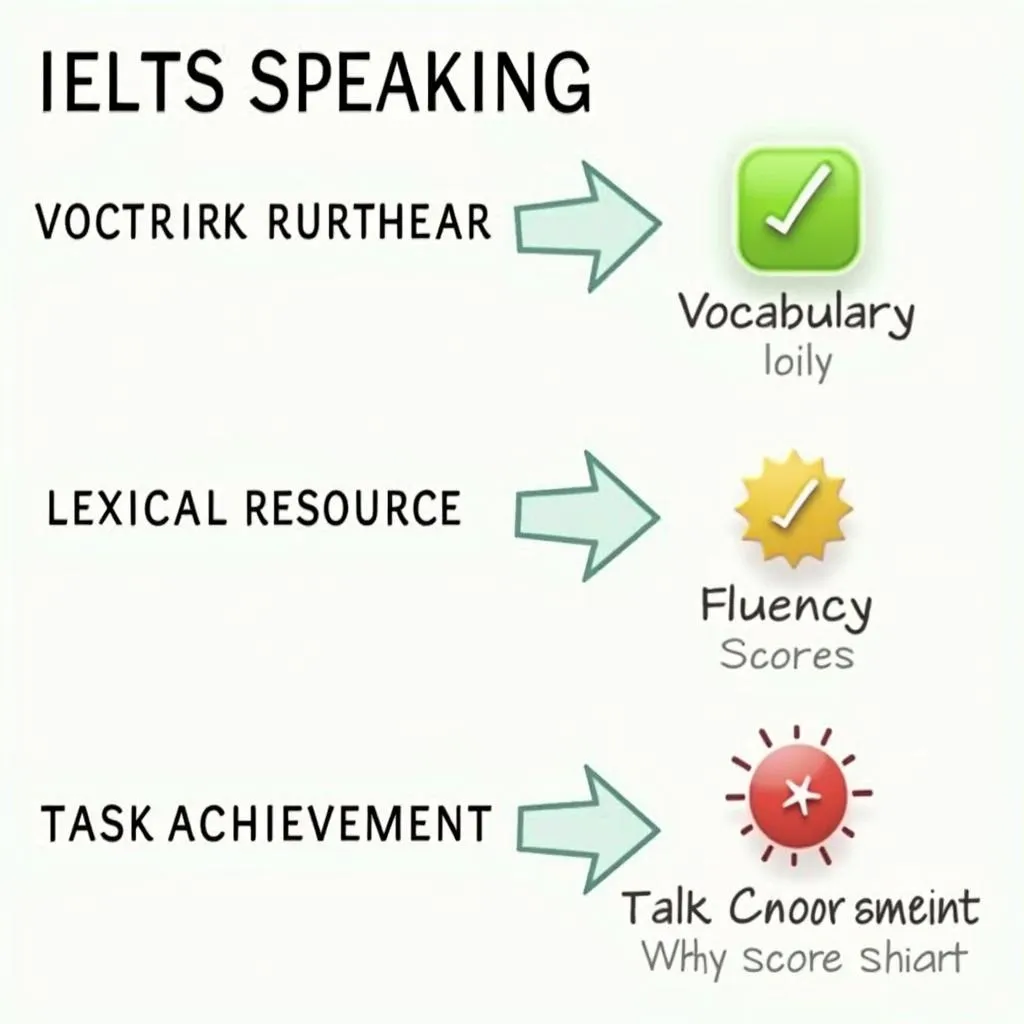Why Vocabulary Matters in IELTS Speaking
Vocabulary plays a crucial role in the IELTS Speaking test, significantly impacting your overall band score. A rich and varied vocabulary allows you to express your ideas more precisely and fluently, demonstrating your command of the English language. It’s not just about knowing many words; it’s about using them appropriately in context.
The Impact of Vocabulary on Your IELTS Score
Examiners assess your vocabulary usage as part of the marking criteria. A wide range of vocabulary can help you achieve higher scores in:
- Lexical Resource: This criterion specifically evaluates your ability to use a variety of words and phrases accurately.
- Fluency and Coherence: Good vocabulary helps you speak more smoothly and connect your ideas effectively.
- Task Achievement: Proper vocabulary enables you to address the questions fully and provide detailed responses.

Common IELTS Speaking Topics and Essential Vocabulary
Let’s explore some frequently discussed topics in IELTS Speaking and the vocabulary you should master for each.
1. Work and Career
- Key Terms:
- Career progression
- Job satisfaction
- Work-life balance
- Professional development
- Networking
Example: “I believe that maintaining a healthy work-life balance is crucial for long-term career satisfaction and professional development.”
2. Education
- Key Terms:
- Higher education
- Lifelong learning
- Critical thinking
- Academic achievement
- Distance learning
Example: “The shift towards distance learning has revolutionized higher education, making lifelong learning more accessible to people worldwide.”
3. Technology
- Key Terms:
- Artificial Intelligence (AI)
- Cybersecurity
- Digital transformation
- Internet of Things (IoT)
- Blockchain
Example: “The rapid advancement of Artificial Intelligence is driving digital transformation across various industries, raising both excitement and concerns about its impact on employment.”
4. Environment and Climate Change
- Key Terms:
- Renewable energy
- Carbon footprint
- Sustainability
- Biodiversity
- Global warming
Example: “Reducing our carbon footprint and investing in renewable energy sources are crucial steps in combating global warming and promoting sustainability.”
5. Health and Lifestyle
- Key Terms:
- Mental well-being
- Holistic health
- Preventive care
- Work-life balance
- Mindfulness
Example: “Adopting a holistic approach to health, which includes both physical and mental well-being, is essential for maintaining a balanced lifestyle in today’s fast-paced world.”
Strategies to Enhance Your IELTS Speaking Vocabulary
Improving your vocabulary for IELTS Speaking requires consistent effort and smart strategies. Here are some effective methods to expand your lexical resource:
1. Read Widely
Expose yourself to a variety of English texts, including newspapers, magazines, academic journals, and novels. This will introduce you to new words and phrases in context.
2. Use Vocabulary Apps
Leverage technology by using vocabulary-building apps. Many of these apps use spaced repetition systems to help you retain new words more effectively.
3. Practice Word Families
Learn not just individual words, but entire word families. For example, if you learn “innovate,” also learn “innovation,” “innovative,” and “innovator.”
4. Create Word Maps
Organize related words and phrases into visual word maps. This helps you see connections between different terms and remember them more easily.
5. Use New Words in Context
Once you learn a new word, make a conscious effort to use it in your speaking practice. This helps reinforce your understanding and makes it more likely you’ll remember the word during the test.
Common Pitfalls to Avoid
While building your vocabulary is crucial, it’s equally important to use it correctly. Here are some common mistakes to avoid:
-
Overusing complex words: Don’t try to use every advanced word you know. Aim for natural, fluent speech rather than forced complexity.
-
Misusing idioms: Only use idioms you’re completely familiar with. Incorrect usage can negatively impact your score.
-
Neglecting pronunciation: Ensure you can pronounce new words correctly. Mispronunciation can lead to misunderstandings.
-
Ignoring collocations: Learn which words naturally go together. For example, we say “heavy rain” not “strong rain.”
-
Forgetting context: Remember that formality levels can vary. What’s appropriate in a casual conversation might not be suitable for more formal parts of the IELTS Speaking test.
Practical Exercises to Boost Your Vocabulary
To help you put these strategies into practice, try the following exercises:
-
Daily Word Challenge: Learn one new word each day and use it in three different sentences.
-
Topic-based Vocabulary Lists: Create lists of words and phrases for common IELTS topics. Review and practice using them regularly.
-
Paraphrasing Practice: Take complex sentences and try to express the same idea using different words. This improves your ability to use a range of vocabulary flexibly.
-
Vocabulary Journal: Keep a journal where you note down new words, their definitions, example sentences, and any personal associations that help you remember them.
-
Mock Interviews: Practice speaking on IELTS topics, recording yourself. Review the recordings to identify areas where you can incorporate more varied vocabulary.
Conclusion
Mastering a wide range of vocabulary for common IELTS Speaking topics is a key factor in achieving a high band score. By consistently applying the strategies and exercises outlined in this guide, you can significantly enhance your lexical resource and speak with greater confidence and fluency during your IELTS test. Remember, the goal is not just to learn new words, but to use them accurately and appropriately in context. Keep practicing, stay curious about language, and you’ll see your IELTS Speaking performance improve dramatically.